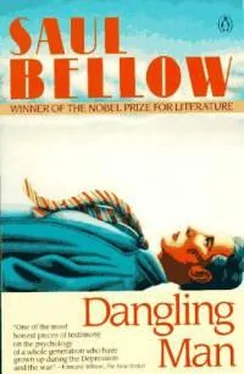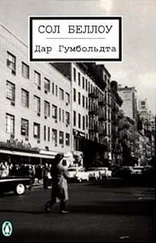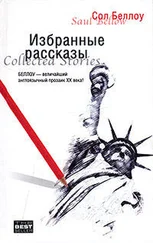Сол Беллоу - Dangling Man
Здесь есть возможность читать онлайн «Сол Беллоу - Dangling Man» весь текст электронной книги совершенно бесплатно (целиком полную версию без сокращений). В некоторых случаях можно слушать аудио, скачать через торрент в формате fb2 и присутствует краткое содержание. Жанр: Современная проза, на английском языке. Описание произведения, (предисловие) а так же отзывы посетителей доступны на портале библиотеки ЛибКат.
- Название:Dangling Man
- Автор:
- Жанр:
- Год:неизвестен
- ISBN:нет данных
- Рейтинг книги:4 / 5. Голосов: 1
-
Избранное:Добавить в избранное
- Отзывы:
-
Ваша оценка:
- 80
- 1
- 2
- 3
- 4
- 5
Dangling Man: краткое содержание, описание и аннотация
Предлагаем к чтению аннотацию, описание, краткое содержание или предисловие (зависит от того, что написал сам автор книги «Dangling Man»). Если вы не нашли необходимую информацию о книге — напишите в комментариях, мы постараемся отыскать её.
Dangling Man — читать онлайн бесплатно полную книгу (весь текст) целиком
Ниже представлен текст книги, разбитый по страницам. Система сохранения места последней прочитанной страницы, позволяет с удобством читать онлайн бесплатно книгу «Dangling Man», без необходимости каждый раз заново искать на чём Вы остановились. Поставьте закладку, и сможете в любой момент перейти на страницу, на которой закончили чтение.
Интервал:
Закладка:
Otherwise, through his very kindness, he may find himself among the hindmost, where the devil, who is so far among the foremost he has doubled his trail, can snatch him up. And then who, if he keeps down his prices and allows himself impulses of charity, will furnish Mr. Fanzel his roast, his cabbage, his roll and coffee, his bed, his roof, his morning Tribune, the price of his movie, and his Prince Albert tobacco?
I–Ie showed me an article by former President Hoover which advocated the abolition of all control over prices, thus encouraging manufacturing initiative in the interests of increased armament production.
"What do you think?" he said.
"What do you think of it, Mr. Fanzel?"
"Such a plan would save the country."
"But should we pay them to save the country? Have they no other reason to manufacture these things?"
"They are in business."
"Aren't they making lots of money now?"
"More will be better for everybody. It's business.
Ah," he laughed, waving his hand at me, "you don't understandit. They will work harder and we will win the war faster."
"But the prices will go up, and then more money will be like less money."
"Oh, oh, you don't understand it," he said, snuffing with laughter through the ginger-colored hairs of his nose and mustache.
"Mr. Fanzel, when you sew a dress for your wife, do you charge her for it?"
"I make only men's garments, not ladies'."
I laid three nickels on the counter and picked up the coat.
"You think it over," he called to me. "They don't make a man the president for nothing."
I walked away, fingering the button which had been threatening for weeks to drop off, weighing the value of its stability against that of the fifteen cents, representing three cups of coffee, or three cigars, or a glass-and a-half of beer, or five morning papers, or something less than a package of cigarettes, or three telephone calls, or one breakfast. Ira's check at the library having been held up, I went without breakfast. Money has been scarce this week. But it does not disturb me to miss a meal now and then. I do not use as many calories as an active man and I have fat to spare. Mr.
Fanzel, I am sure, would have been appalled to learn that he had deprived me of my toast and coffee, despite the fact that he has every theoretical right to a clear conscience. I should be taking care of myself. He can't be responsible for me. I recall the words of the suitor Luzhin in Crime and Punishment. He has been reading the English economists, or claims he has.
"If I were to tear my coat in half," he says, "in order to share it with some wretch, no one would be benefited. Both of us would shiver in the cold." And why should both shiver? Is it not better that one should be warm? An unimpeachable conclusion. If I were to tell this to Mr. Fanzel (without mentioning breakfast), bewould certainly agree. Life is hard. Vae victist. The wretched must suffer.
January16
IAIIILY" quiet day".
January 18
I sAa" wA'rcraire Marie this morning as she changed the sheets and dusted and washed the windows.
To see her at the windows fascinated me especially. It was merely her work, but even she seemed to derive a sober pleasure from it, following the rag over the glitter with her eyes, pulling the frames back and forth on their resonant cords, moving the curved water line further and further across the spotted glass.
To make a dirty surface cleanma very simple, very human matter. I, while shining shoes, grew partly aware of it. In those moments at the window, how different Marie was, how purely human as she rubbed the glass. I sometimes wonder if it can be entirely a source of pleasure to clean. There is too much urgency in it; sometimes it becomes a preoccupation of body and heart. "Ah, in anxiety I lie, thinking, what surface tomorrow?"
But it has its importance as a notion of center, of balance, of order. A woman learns it in the kitchens of her childhood, and it branches out from sinks, windows, table tops, to the faces and hands of children, and then it may become, as it does for some women, part of the nature of God.
January 19
StrsIv. Ftasor came over in tears to ask Iva what to do about her husband. I withdrew and left them to talk. Susie and her husband wage an endless fight. He, Walter, is a ruddy, big-jawed, blond Dakota boy of the kind city girls are often attracted to. Susie, who was a schoolmate of Ira's, is six years older than he. He resents this difference in their ages, he resents having been trapped into marriage, and, most of all, he resents the baby, Barbara.
Recently Ira indignantly wanted me to punch his head for gagging the child with a handkerchief because she disturbed his sleep. Last week he pressed her jaws together for the same reason, almost suffocating her.
This week he bruised Susie's face. Ira advised Susie to leave him, and Susie says she intends to.
Ivy, and I met downtown at six. The occasion was our sixth wedding anniversary. She had decided that we deserved a celebration. We had had none New Year's Eve. It had been a bad year-all the more reason for a good dinner and a bottle of French wine. She was determined that this was not to be just another evening.
I came down on the El, getting off at the Randolph and Wabash station. There were crooked streaks of red at one end of the street and, at the other, a band of black, soft as a stroke of charcoal; into it were hooked the tiny lights of the lake front. On the platform the rush-hour crowds were melting under the beams of oncoming trains. Each train was followed by an interval of darkness, when the twin colored lamps of the rear car hobbled around the curve. Sparks from the street below were caught and blanked in the heavy, flat ladder of ties. The pigeons under the sooty, sheet-iron eaves were already asleep; their wadded shadows fell on the billboards and, with every train, fluttered as though a prowler had sprung from the roof into their roost.
I walked along East Randolph Street, stopping to look at the rich cakes and the tropical fruits. When I came to the smoky alley alongside the library where the southbound cars emerge, I saw a man sprawl out in front of me, and at once I was in the center of a large crowd and, from a distance that could not have been as great as it seemed, a mounted policeman standing before a Cottage Grove car was gazing down.
The fallen man was well dressed and above middle age. His hat lay crushed under his large bald head, his tongue had come forward between his lips, his lips seemed swollen. I stooped and tore at his collar. A button sprang away. By this time the policeman had pushed his way forward. I drew back, wiping my hands on a piece of paper. Together, we stared at the [allen man's face. Then my attention was drawn to the policeman's own face. It was long and as narrow as a boot. His features were sharp, red, wind-scarred, his jaws muscular, his sideburns whitish, intersected by the straps of his stiff blue cap. He blew his steel whistle. The signal was not necessary. Other uniformed men were already coming toward us.
The first to arrive was elderly himself. He bent and reached into the fallen man's pockets and produced an old-fashioned strap-fastened wallet like my father's. He held up a card and spelled the name.
The victim's broad coat was hitched up behind, his chest and belly rose hugely together as he labored, snoring, for breath. A path was cleared for the approaching ambulance. Its bell beat rapidly; the on. lookers moved away, reluctant to disengage themselves. Would the red face go gray, the dabbled hands stop their rowing, the jaw drop? Perhaps it was only an epileptic fit.
As I withdrew with the others, I touched my forehead; it had begun to smart. My finger tips searched for the scratch Aunt Dina had left on it the night of my mother's death. The nurse had called us. From all parts of the house we came running. My mother may still have been alive, though her eyes were shut, for when Aunt Dina threw herself upon her, her lips seemed to move crookedly in a last effort to speak or kiss. Aunt Dina screamed. I tried to pull her from the body, and she lashed at me, clawing with enraged fingers. In the next blurred moment, my mother was dead. I was looking at her, my hand pressed to my face, hearing Aunt Dina cry, "She wanted to say something@ffShe wanted to talk to me!"
Читать дальшеИнтервал:
Закладка:
Похожие книги на «Dangling Man»
Представляем Вашему вниманию похожие книги на «Dangling Man» списком для выбора. Мы отобрали схожую по названию и смыслу литературу в надежде предоставить читателям больше вариантов отыскать новые, интересные, ещё непрочитанные произведения.
Обсуждение, отзывы о книге «Dangling Man» и просто собственные мнения читателей. Оставьте ваши комментарии, напишите, что Вы думаете о произведении, его смысле или главных героях. Укажите что конкретно понравилось, а что нет, и почему Вы так считаете.







